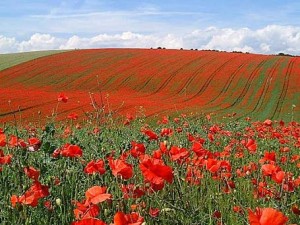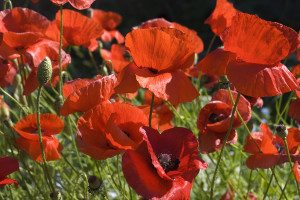I love red poppies! They are scattered strategically around my house in various arrangements. In my office and entry way, etched into a glass plate and painted on a porcelain jug. A beautiful watercolor featuring the paper-thin red poppies adorns the wall in my dining room. These blood-red beauties are my all-time favorite flowers. Like life itself, they are fragile. Don’t even consider picking one—the bloom will bow its precious head and die within minutes of being plucked.
As a child, my family and I would sometimes go to the nearby corn (wheat variety) fields and help the local farmer harvest the ripened stalks. If you’ve ever walked through wheat fields (or harvested grain by hand) you know the stalks are unforgiving and sharp. They can scratch you to pieces in no time if you aren’t careful.
In England, the beautiful red poppies grow wild amidst the corn and wheat. I used to wonder how something so gentle and captivating as a poppy could thrive next to the sharp stalks of the grain crops. Occasionally while plucking the stalks of corn, my little hand brushed against the soft, paper-thin face of a poppy. I pretended the petals were kissing my hands and healing the scratches.
The poppies touched me in an unforgettable way. They stole my heart long before I was aware of the haunting poem that references the Flanders poppies.
Once I heard the poem and understood that poppies represent remembrance and that they commemorate the fallen in war, I lost not only my heart to the poppy but a part of my soul was touched forever. The blood-red poppies in my office are daily reminders of those who sacrificed their lives fighting for their country, that I (and you) might know the freedom we so value. A freedom we must never forget or take for granted. We must be grateful—and always vigilant. It is our duty to protect the honor and sacrifice of the fallen, because freedom in never free. It bears a priceless cost.
The poppies never forget. They faithfully raise their reverent blooms skyward in Flanders Fields year after year in remembrance of those who died.
“In Flanders Fields” is one of the most notable poems, written during World War I by Canadian physician and Lieutenant Colonel John McCrae. He wrote it on 3 May 1915, after witnessing the death of his friend, Lieutenant Alexis Helmer the day before. The poem was first published on 8 December 1915 in a London-based magazine, named Punch.
In Flanders fields the poppies blow
Between the crosses, row on row,
That mark our place; and in the sky
The larks, still bravely singing, fly
Scarce heard amid the guns below.
We are the Dead. Short days ago
We lived, felt dawn, saw sunset glow,
Loved, and were loved, and now we lie
In Flanders fields.
Take up our quarrel with the foe:
To you from failing hands we throw
The torch; be yours to hold it high.
If ye break faith with us who die
We shall not sleep, though poppies grow
In Flanders fields.
This poem touched the heart of an American teacher named Moina Michael who composed a poem in response where she vows, on behalf of us all, to keep the faith.
We Shall Keep the Faith by Moina Michael, November 1918
Oh! you who sleep in Flanders Fields,
Sleep sweet – to rise anew!
We caught the torch you threw
And holding high, we keep the Faith
With All who died.
We cherish, too, the poppy red
That grows on fields where valor led;
It seems to signal to the skies
That blood of heroes never dies,
But lends a lustre to the red
Of the flower that blooms above the dead
In Flanders Fields.
And now the Torch and Poppy Red
We wear in honor of our dead.
Fear not that ye have died for naught;
We’ll teach the lesson that ye wrought
In Flanders Fields.
 So this Memorial Day, remember to honor the fallen in world wars, wherever they fell, amid the poppies, or in the dust. Now it’s our turn to keep the faith, to catch the torch and hold it high and honor those souls who gave the ultimate sacrifice in the name of freedom.
So this Memorial Day, remember to honor the fallen in world wars, wherever they fell, amid the poppies, or in the dust. Now it’s our turn to keep the faith, to catch the torch and hold it high and honor those souls who gave the ultimate sacrifice in the name of freedom.
Never forget the precious blood spilled by those who carried the torch before us—and for us.
A Note on the Poppy: It is a symbol of Memorial Day here in the USA. The wearing of poppies in honor of America’s war dead is traditionally done at the end of May on Memorial Day. In the UK ,the poppy is worn on Armistice Day (Remembrance Day). It is commemorated every year on 11 November to mark the armistice signed between the Allies of World War I and Germany at Compiègne, France at 5:45 am, for the cessation of hostilities on the Western Front of World War I, which took effect at the “eleventh hour of the eleventh day of the eleventh month” of 1918. In Britain, back in 1921, the poppies worn were not made from paper, but from real silk.
1 Peter 1:24-25

I have the very poem you so thoughtfully put in your blog. it means a lot to me because I believe Chuck sent it to me a long time ago.you have a soldier you can hug and I pick mine from the group wearing their proud caps stating which service they were in. ofcourse I first ask permission to give them a hug. love too all sis
This is really interesting, You’re a very skilled
blogger. I have joined your feed and look forward to seeking more of your excellent post.
Also, I have shared your site in my social networks!
I got this web page from my buddy who informed me on the topic of this web site and at the
moment this time I am browsing this website and reading
very informative posts here.
Hi there it’s me, I am also visiting this site daily, this web page is actually nice and the
visitors are in fact sharing nice thoughts.
Happy to know you are enjoying my posts! Thanks for taking time to comment.
Appreciate your visits Gregory. Thanks for your kind words.
Thanks for following my blog Millie – so appreciate the feedback.
Poppy’s remind me of you and always will.
I love that Millie loves her vets!!
My students learned the McCrea poem “Flanders Feild” when I taught World history.